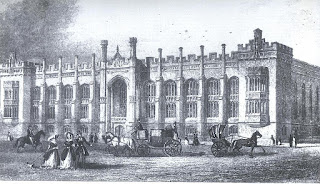The brutal treatment of natives in Britain's colonial past was emphasised when a Liverpool woman was jailed for manslaughter after a man died from wounds received during a flogging.
In 1920 Major Geoffrey Selwyn, whose father was a former headmaster of Liverpool College, took advantage of soldier settlement scheme and emigrated with his wife Helen from Liverpool to Kenya. They bought land to farm in Kitale, employing a number of Kuosh locals.
Geoffrey had been injured in the war and after ten years he let his wife take over the running of the farm as his health deteriorated. On 8th June 1934 he noticed that some cowbells were missing and he set off with five of his servants to follow the tracks of the thieves.
Geoffrey fell behind his staff and when he caught up with them at a neighbouring farm they were arguing with some Suk natives. Six of them were brought back to the Selwyn's farm where Helen ordered that they each be flogged. She watched on as four of her men held each down in turn, while another beat them with a broken rubber tyre. This broke before the last man faced his punishment and he was instead beaten with a leather strop.
The man who was beaten last, named as Keyen, died in hospital two weeks later of septicaemia which developed after the wounds on his thighs became infected. Mr and Mrs Selwyn were arrested, along with their five servants. Geoffrey, whose brother Edward was the Dean of Winchester Cathedral, had to be taken to hospital under guard and died of malady at the age of 46. Helen was admitted and treated for a heart complaint before being released. On 28th July Helen and five servants appeared at the Magistrates Court in Kitale for committal to the Supreme Court in Nairobi.
On 24th September Helen was allowed to sit on a chair next to the dock due to her condition. The trial almost had to be stopped when one of her servants collapsed and had to be taken to hospital, but the judge ordered that it should proceed. Despite the flogging having taken place three months earlier, the scars and bruises were still evidence and an Indian medical assistant who attended to them told how shock could have killed any one of them in the aftermath. He believed that Keyen's death was not of shock however, but due to him being beaten with a different implement to the others, which was dirty hence led to the wounds becoming infected.
A statement made by Keyen when he was dying was read out, which said that he did not know anything about any cowbells and couldn't understand why he was beaten. The others who had been flogged said they didn't steal the cowbells and they also told how Geoffrey refused to have them transported to hospital, saying 'I won't have any baboons in the car.'
When Helen took the stand, she took full responsibility for ordering the floggings but bemoaned the lack of luck she and her husband had had. She claimed that thefts were on the rise but they couldn't afford security guards even though they feared for their oxen. Believing the strop to be a suitable implement for carrying out the beatings, she explained how the thighs were on the receiving end as no internal organs would be damaged. Claiming that she didn't know blood had been drawn she said with tears in her eyes 'I had no intention of killing, no intention of seriously injuring, my only intention was to make them confess.' A British doctor appeared on her behalf to say that the conditions at the hospital were dirty and that was where the germs were picked up which infected the wound.
In summing up the judge said the facts did not amount to murder but all six defendants were found guilty of manslaughter. The jury recommended mercy for Helen, who was sentenced to one year's imprisonment while the servant's each received a term of one month.


No comments:
Post a Comment